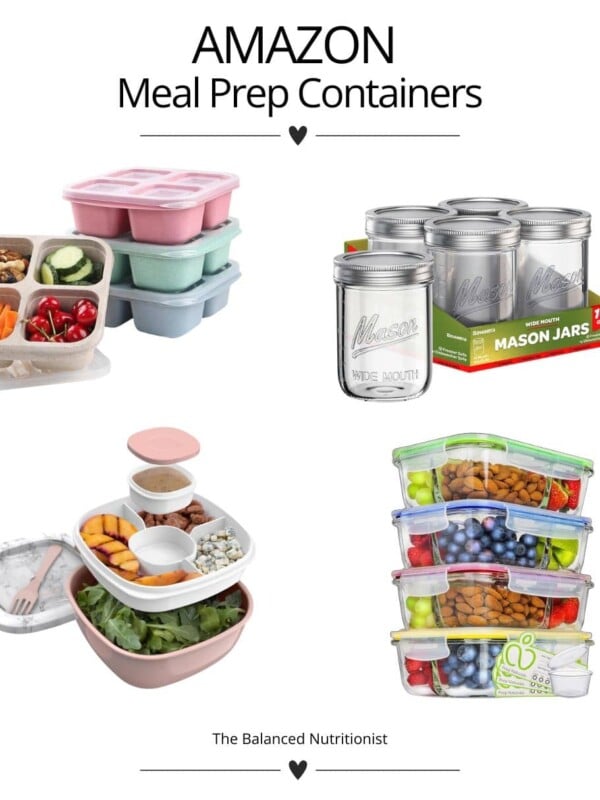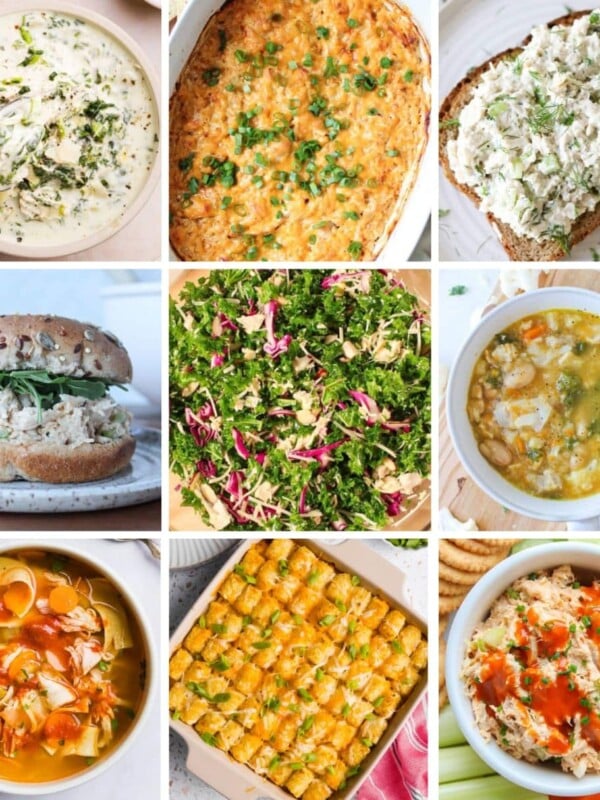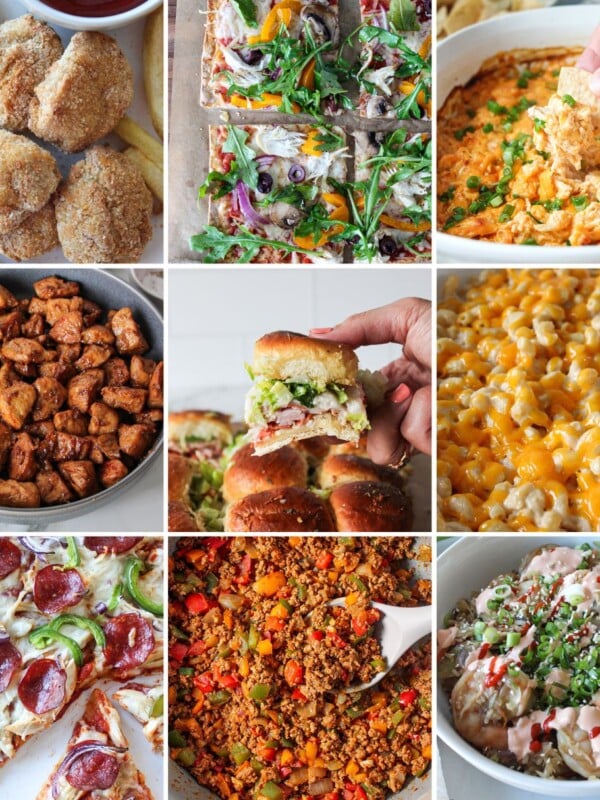Navigating Food Freedom When You Have Weight Loss Goals
On Dec 20, 2022, Updated Feb 29, 2024
This post may contain affiliate links. Please read our disclosure policy.
We’re finally saying “see ya later” to diet culture, and finding food freedom is encouraged everywhere you turn. Yay!
But if you have weight loss goals, health concerns, or you just don’t feel your best at your current weight (valid!), this can sometimes be a confusing message.
Should we just eat whatever we want, whenever we want?
Hi, I’m Jamie and I’ve been a Registered Dietitian for going on a decade. In that time I’ve worked with hundreds of women who all have one thing in common – feeling defeated after another diet leads them right back to square one. But, the good news is this trend doesn’t have to continue.
So: let’s talk about what food freedom is and how you might just be able to navigate that AND your weight loss goal.

What does food freedom mean?
There is so much nuance to what food freedom means, but, in a nutshell, food freedom means giving yourself permission to let go of the rules and restrictions of traditional diet culture and eat what you want.
If that sounds scary, ask yourself: Has sticking to rigid, restrictive diet rules given you long-term success? Probably not, or you wouldn’t be here reading this article!
It’s incredibly common for women to spend decades of their life dieting with no real long-term success. It begs the question: how effective is dieting if you have to keep going back on diets?
What I like to think about when I think about food freedom is focusing on health-promoting habits that fuel your wellness goals and leave you feeling your best without restricting yourself for the sake of “weight loss at all costs.”
It’s super common to think that if you embrace food freedom, you’ll just eat nothing but junk food. But, it’s important to remember that the entire premise behind food freedom and having a good relationship with food is feeling your best.
Would it feel great to eat nothing but cake all day long? Nope. Would it feel good to eat nothing but plain grilled chicken and broccoli all day long? No! The two “feelings” would be different, but neither would leave you feeling your best physically or mentally.
Shifting your focus from weight loss and seeing the lowest number on the scale to feeling good physically and paying attention to other “measures” can be confusing! I get it because I’ve been there myself.
My story might be like yours
When I was younger I struggled with my weight constantly fluctuating. I felt like I could gain 5 pounds just by looking at dessert. I felt uncomfortable in my body and struggled with feeling in control around food.
Strict diets and obsessing over weight loss only made things worse. I wasn’t seeing “success” from anything even though I desperately wanted to.
What finally worked for me – and what works for SO many others – is finding a balance with food and your health goals, weight loss or not.
Let’s talk about some practical ways you can find yours.
Your mind is a powerful tool
I’m not here to convince you to ditch your weight loss goals, but rather to open your eyes to the reality of weight loss and help you find a better way to approach it.
The first thing you have to look at is your mindset around dieting and weight loss. When you think about food, are your thoughts focused on “I can’t eat X because it’s unhealthy?” Or do you dwell on that cookie you ate earlier and just can’t seem to shake the guilt?
When we tell ourselves a food is “bad” and can never be eaten, studies have shown negative mental effects often come with a restrictive diet mentality.
It’s time to change your mindset from “I can’t have that” to “I enjoy eating this because it gives my body nutrients and helps support my body being at its healthiest weight.”
You can start by working on building some healthy habits. And PS- I have an entire guide that teaches you how to do this: The Balanced Basics Handbook!

How to create healthy habits
Creating healthier habits is a big step to reaching (and staying at) your healthiest weight – aka your “set-point weight.” It takes some trial and error to make them stick, but with these three attributes, your habits will help propel you toward your goals. The three keys are to be:
- Consistent
- Sustainable
- Flexible
1. Consistent
What you’re doing most of the time is truly what matters. Consistency is the special sauce to creating healthy habits that actually have lasting impact.
If you’re someone who spends 5 days strictly dieting and then goes off the rails for 3 weeks, you might be wondering why your efforts aren’t seeing progress.
What’s better? Daily habits that are mostly pretty solid with some fluctuations and far from perfect, or a few random days per month where you’re extra strict?
Putting our effort into changing our eating habits can be frustrating if you’re not feeling differently or seeing progress. That’s why consistency is even more important. If you’re constantly throwing in the towel and trying the newest diet that’s thrown your way, you’re unlikely to see progress.
Consistently practicing your new habits is the most important thing, hands down. But there are two more things you absolutely need so that consistency can happen!
2. Sustainable
Think about a time that you tried a new diet that took a ton of effort on your end. Maybe you needed to make completely separate meals for yourself vs. your family, you were supposed to exercise twice every single day, or you couldn’t eat ANY sugar.
Maybe you lasted a few days, or even a few weeks, but eventually you realized that it just was not going to fit into your life.
And unfortunately, any weight loss or “success” that happened probably came back with a vengeance right when it all stopped.
If your new habits or diet changes are difficult to maintain, the “results” will be impossible to sustain. Remember, if you want something to stick you have to like your new habits better than the old ones.
This is why so many diets fail. It’s not you, it’s the crazy unsustainable diets out there.

3. Flexible
Flexibility is the key to having a balanced, healthy diet and good relationship with food.
If one “wrong” choice sends you into a spiral for the rest of the day, this is definitely something work on.
This is real life. There WILL be days when you eat a “fun” treat you didn’t plan to, or skip the nutritious lunch you packed to go out for a meal with friends.
And that’s OK! You should be able to enjoy your meals without feeling guilty for indulging every so often.
Too much rigidity can actually backfire and cause you to obsess over food restrictions even more.
Relax. And give yourself some wiggle room.
Important things to remember
We tend to focus on the number on the scale above all else, but I don’t actually recommend that.
Your weight doesn’t tell us that much
Your weight on the scale is the total amount that gravity is pulling on your body; it doesn’t tell us how much of your weight is your bones, your muscle, the blood pumping around in your veins, or even, exactly how much fat tissue you have in your body.
Did you know that when you lose weight you usually lose muscle too? And the faster you lose weight, the more muscle it tends to be.
That means that really fast weight loss is not advised at all, because not all weight loss is created equal. You want to preserve as much muscle mass as you can so that you can stay strong and healthy.
In order to better understand your health journey, you can occasionally (but not obsessively) check in with body measurements or how clothes are fitting.
If your strength training is helping to build muscle, you’re healthier and stronger but that might not actually change what the scale says at all.
Only looking at your weight ignores all other measures of health, including your blood pressure, blood sugar, how you feel, how much you’re sleeping at night, or your stress levels.
There are SO many other factors that contribute to your overall health and wellness; please track more than your weight!
Lowest weight is not best weight
Your set-point weight is the weight at which you feel good both physically and mentally; it doesn’t require restrictive dieting or compulsive exercising to maintain it and you’re not consumed with thoughts of food, tracking, calories, or points.
What is hard for many of us is that we can’t pick our set-point weight. Instead, our set-point weight is kind of like our shoe size; our genetics play a big role in what our adult body looks like.
If you’re constantly trying to be at your lowest weight possible, you’re probably going to find that the means to get there are hard to maintain. And that’s because your “set-point weight” might not be reaching the lowest weight of your life.
And for many people, it’s not. It’s better to focus on the health benefits of habit changes rather than a magic target number.
Losing weight for health concerns
If you’re reading all of this and you’re thinking “this is great, but I really need to lose weight for health reasons”, let’s talk about it.
There are valid reasons to focus solely on losing weight and that’s a conversation for you and your doctor. But, embracing many of these principles can help you maintain your relationship with food and stick to habits long-term.
Remember, if your methods are unsustainable, it’s not going to give you sustainable results anyway. And then what was it all for?
Regardless of your goals, focusing on your habits over a specific number is still the most helpful thing! Many health risk factors are influenced most by your habits, not the specific number that’s showing up for you on the scale (don’t worry, we’ll get into them!).
Find your “why” – beyond weight loss
Why do you want to have healthier habits besides weight loss? Dig deep here and think about what the real reason is.
For example, it might be, “I want to lose weight to run around and play with my kids.” Or, “I want to live a long and active life with my spouse.”
Everyone’s “why” will be a little different and it can be helpful to write it down in detail and revisit it from time to time.
Battling the last few pounds
If you’re battling with the last few pounds ask yourself: “What do I actually want here? More energy? More muscle? More confidence?”
Maybe you want to work on your exercise habits to build more muscle and feel stronger versus the specific number on the scale. Or work on body image to improve confidence. Remember that a specific number is unimportant.

Habits that support your body’s best weight
There is a lot that goes into cultivating true health and wellness. Here are a few aspects that you can begin to focus on for lasting food freedom and weight loss.
Eating consistent, balanced meals
Eating healthful, balanced meals most of the time is a great way to get closer to your health and wellness goals. But remember, a little flexibility is important here!
Eating consistent, balanced meals that provide what you need nutritionally (and mentally) takes care of the biological need to eat so you feel more in control around food.
When you think about balanced meals I want you to think about lots of color on your plate (hello fruits & veggies!), adding fiber-rich foods whenever you can, prioritizing a good protein source, and including foods that you enjoy!
One of my most favorite pieces of advice is to ask yourself: What can I add?
For example, if your wanting a bowl of chips, can you ask yourself what you could add to make it a more nutritious and filling snack? Maybe you add a Greek yogurt dip or a handful of sliced veggies to go with.
Your eating habits don’t need to be perfect, but consistently making changes and adding in nutritious foods can make a big difference.
Need structured step-by-step guidance with this? Grab The Balanced Basics Handbook!
Avoiding tight food restrictions
If you’re experiencing a lot of weight cycling or struggling with overeating frequently, it’s a red flag that what you’ve been trying to do is too restrictive.
Instead of “I need to stop eating sweets to lose weight,” try, “What habits can I start prioritizing and adding to my life that support my healthiest weight?”
Listening to hunger and fullness cues
This one’s important if you find yourself eating out of boredom or eating impulsively.
If you’ve dieted for a long time, listening to your hunger and fullness cues can be super difficult because you’re feelings around food are a little confusing!
I recommend taking a pause and asking yourself: Am I really hungry right now? What do I need? Do I need a snack? A meal? Am I tired and need to wind down for the night?
Sometimes the simple practice of taking a pause to having an internal conversation with yourself about how you’re actually feeling can go a long way. If you can, let yourself take a 5-10 minute break from the kitchen so that you can decipher what’s really going on.
This goes for stopping when you’re full too. It takes practice! It’s okay if it doesn’t go perfectly at first. Keep practicing checking in with yourself while you’re eating so that you can truly understand when you’re ready to stop.
Moving your body
There are so many ways to exercise! Don’t want to lift weights or run on the treadmill? You don’t have to. Maybe you used to play basketball, or you enjoy swimming, walking through the neighborhood, or even yard work.
Finding any movement that you enjoy can help you reach your best weight and feel better too.
If you dread your current exercise routine, or the thought of starting one, consider a new option!
Exercise has many benefits beyond the calorie burn, from reducing stress to helping you get a better night’s sleep. And you know what? Those two things keep your health moving forward too – the habits are all connected!
Managing stress
Have you ever craved sweets when studying for an exam or prepping for a nerve-wracking job interview?
You’re not alone – studies show people tend to crave more high-calorie, high-fat foods when they’re stressed out.
Instead of overeating to handle the stress, consider journaling, going for a walk, meditating, or talking to a friend. These are just a few ideas, but there are many ways to calm your nerves so you can make more intentional choices aligned with your weight loss goals.

Sleep
Getting enough ZZZs is a bigger deal than you might realize. Studies have shown significantly higher rates of obesity in people who sleep less than 7 hours a night.
Not getting quality sleep actually has a negative impact on our hunger and fullness hormones aka you’re hungrier and it takes more for you to feel satisfied.
When you’re sleep deprived your body craves high-energy, high-calorie foods to keep you going throughout the day. Do your best to limit screen time before bed and keep a regular sleep schedule.
Recap
At the end of the day, there are SO many factors that affect your weight and health, but the main takeaway is you can achieve your goals without rigid diets!
If you want a structured step-by-step method for building more balanced eating habits and a healthy relationship with food, grab my comprehensive guide, The Balanced Basics Handbook! You’ll learn exactly how to build balanced meals as well as everything form portion sizes and mindset to when to eat.
More resources
- The Balanced Basics Handbook: A complete step-by-step starter guide for finding balance with food.
- Easy Balanced Bites: An e-book cookbook with 30 easy balanced recipes and weekly grocery lists.
- Conquer your Cravings Course: A free mini-course on snacking and cravings with the Ultimate Balanced Snack Guide PDF download.
- 3-Day Balanced Eating Plan: Three days of delicious balanced meals and snacks with recipes planned for you straight to your inbox!













